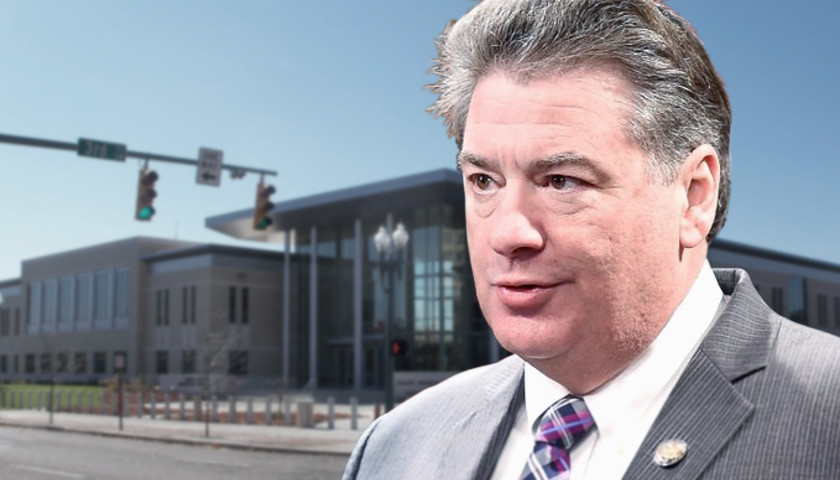The Toledo-Lucas County Health Department announced its first presumptive case of coronavirus in the county. The person, who was not identified, had recent travel to an area where the infection is present.
Read the full storyAuthor: Maggie Leigh Thurber
Ohio Bill Will Make All Charter Schools Non-Profit
All charter, or community, schools in Ohio will be non-profit entities, or have to close, if a new bill introduced in the Ohio House is passed.
Read the full storyBipartisanship in the Ohio House
In this age of hyper-partisanship, there is still bipartisan agreement in the Ohio House.
Read the full storyThe ‘Other’ Work of the Ohio General Assembly
Should Dunkleosteus terrelli be Ohio’s official fossil fish? Should the sugar cookie be the official cookie of the state? What about the Monarch Butterfly? Should it become the official butterfly for Ohio? The Ohio Senate believes the answer to the first question is yes. Senate Bill 123 was unanimously passed in the Senate and is now pending in the House. And it’s looking pretty favorable for the sugar cookie and Monarch Butterfly — unless some other cookie or butterfly lovers object. These are just three of the questions facing the Ohio General Assembly this year, in what some consider to be part of the “other” work that representatives and senators do. Amidst the bills on more serious matters, like the state budget and drug sentencing reform, are a host of miscellaneous measures: naming sections of roads, designating special license plates, or declaring a month/week/day in recognition of a person or illness. In fact, such bills are 14 percent of the total in the House and 12 percent of the total in the Senate. Naming a section of a road in Ohio is usually done for person who has died, like a law enforcement officer or member of the military. Sometimes,…
Read the full storyState Senator Calls for Study on African Americans in Ohio
An Ohio senator is calling for a study that examines the “progress and challenges of African Americans in Ohio.” State Senator Sandra Williams (D-21) introduced Senate Bill 71, which would create and fund a 30-member committee to examine the contributions of, and issues facing, African Americans in the state. The bill is timed to commemorate the 400th anniversary of the first documented arrival of African slaves to America. They arrived in 1619 on board the White Lion, a Dutch ship that landed at Point Comfort in Hampton, VA. According to the legislation, the first thing the group would do is look at all existing studies or reports from public or private research institutions in Ohio. The bill specifically mentions the Report of the Ohio Commission on Racial Fairness and the Governor’s Task Force Report on Black and Minority Health. Then they will issue an initial report including: The progress or lack of progress of African Americans in Ohio with respect to housing, transportation, health, education, employment, environment, business development, and any other policy area that the committee chooses to consider; The contributions and achievements by African Americans in Ohio; and Recommendations for addressing the challenges identified. Following that initial report, the committee will take four…
Read the full storyOhio Lawmakers Urged to Eliminate ‘Redundant’ and Costly Motor Vehicle Repair Board
Since The Buckeye Institute first started publishing its Piglet Book in 2005, it’s recommended eliminating Ohio’s Motor Vehicle Repair Board. The Buckeye Institute, an independent think tank whose mission is to advance free-market public policy, issues a regular Piglet Book that analyzes “Ohio’s proposed biennial budget and offers savings for policymakers to consider as they debate the state’s two-year budget.” This year’s book again lists the Motor Vehicle Repair Board, saying ending it will save Ohio taxpayers about $1.2 million. “The Motor Vehicle Repair Board performs functions that the private sector already performs admirably,” the book states. “Consumers have adequate access to information on the quality of facilities from various sources, including the Better Business Bureau to Angie’s List, which make this state board redundant and unnecessary.” When it was first created in 1997, it was called the Motor Vehicle Collision Repair Registration Board. It was supposed to oversee a new registration process for businesses in the state that did five or more collision repairs within a 12-month period. Unlike some government regulations, it was businesses in the state who asked for the board and registration in order to address “chop shops” and “fly-by-night” operators. According to the Automotive Services…
Read the full storyNew House Bills Seek More Limits on Ohio Traffic Cameras
The use of photo-enforcement devices – also known as traffic cameras – has a contentious history in Ohio. Cities first started using them in 1999 when the Toledo City Council passed an ordinance authorizing their use. They made it a civil violation with a fine, but no points on a driver’s license like a police-issued ticket. Other cities followed and citizens often attempted ballot initiatives to eliminate them. Not having much success at the local level, citizens turned to the state legislature which responded with various limits and laws. First, the legislature tried to ban the use of cameras, but that was overruled by the Ohio Supreme Court under the state constitution’s “home rule” authority. Home rule basically means that cities and certain townships have the power to govern themselves and they have the power to adopt and enforce certain regulations that don’t conflict with the state’s general laws. This includes the power to adopt and enforce local police regulations and the Supreme Court rulings have said traffic photo-monitoring devices fall under those police regulations. Then the legislature said that if traffic cameras can’t be banned, a police officer must be present in order for any ticket from the camera…
Read the full storyOhio Bill Would End ‘Right of First Refusal’ for Schools of Choice
For nearly eight years, charter and community schools in Ohio have had an advantage: first dibs on any public school property that was for sale. It’s a process called a right of first refusal. House Bill 43 will eliminate that advantage. Right now, if a school district wants to sell or lease unused real property, like a school building that hasn’t been used in at least two years, it has to first offer that property to schools of choice in the district. Community or charter schools, STEM schools, and college preparatory boarding schools are schools of choice in Ohio. The school district is required to let all the schools know that the property is available and then give them 60 days to respond. If no school of choice is interested, the district can sell the property at a public auction and anyone can bid on it. The law was created in 2011 in order to give educational entities first priority in the sale of educational buildings, something public school districts had been reluctant to do. But even with the law, schools of choice encountered problems. In a 2016 study of Ohio’s top-performing charter schools, “about half (49 percent) report that local…
Read the full story







